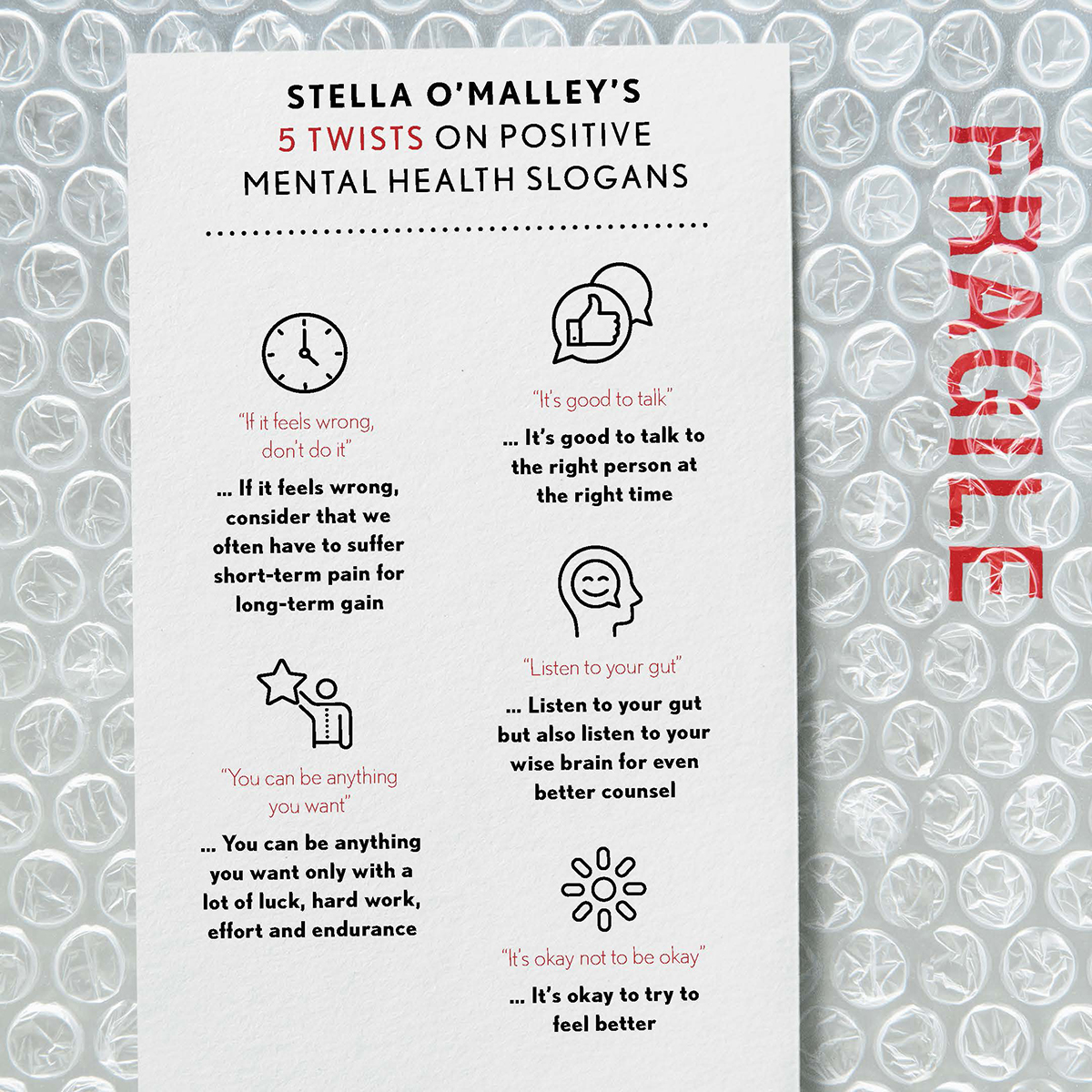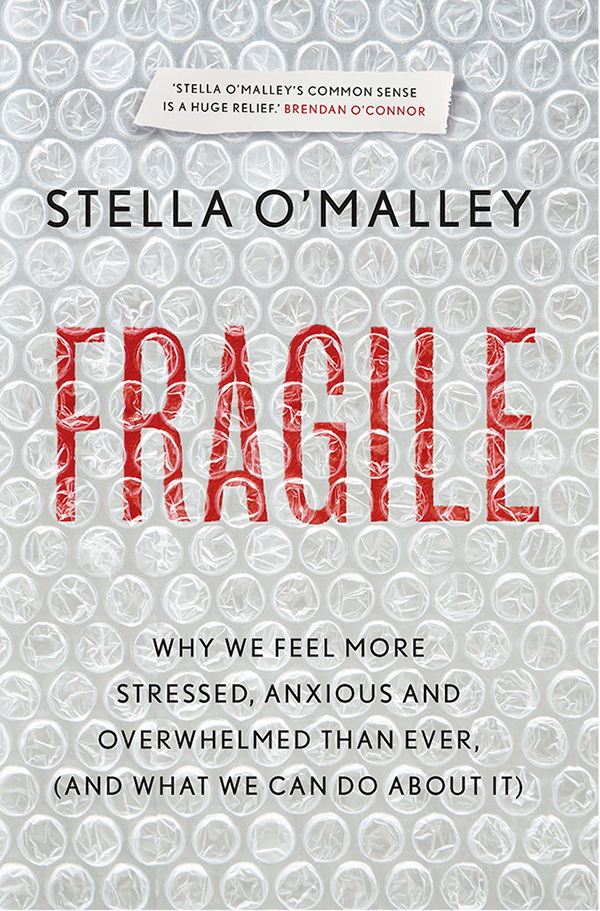Psychotherapist Stella O’Malley’s no-nonsense new book tackles anxiety and our fragile nation
Psychotherapist Stella O’Malley is one of Ireland’s leading voices on what influences young people’s behaviour today. Author of the bestselling Bully-Proof Kids and Cotton-Wool Kids, Stella is now turning her focus to the whole population with her newest book, Fragile: Why We Feel More Anxious, Stressed and Overwhelmed Than Ever (and what we can do about it). In this book, readers will learn why – when it comes to handling anxiety – avoidance strategies don’t help. In fact, they usually make anxiety far worse.
Stella argues that the extraordinary rise in the numbers experiencing anxiety has coincided with the growth of irrational, inappropriate and just plain wrong approaches to dealing with it. In Fragile, she highlights the most effective approaches to combat anxiety and stress, also pointing out how the media, society and the world in general misguidedly promote the worst possible strategies for managing anxiety.
Fragile is divided into three parts: the first part, ‘How Anxiety Impacts You’, describes exactly how the anxious mind works and demonstrates how to get out of the common traps we fall into when we’re anxious. The second part, ‘How the World is Making Us Anxious’, focuses on how most of us are weakening ourselves by doing too much, trying too hard and consuming too much. Finally, ‘The Recovery: Leaving Anxiety Behind’, identifies different approaches that will enable readers to live a calmer, more satisfying life. Through strategies, tips and case studies, readers will learn how to withstand feelings of worry and panic, and not become overwhelmed. They will then be free to enjoy the relative wealth and stability that the developed world already offers, without getting caught up in a constant search for more.
Here is an edited extract from chapter 5, ‘Is it Always “Good to Talk”? Misinterpreting Mental-Health Messages’ which makes for a fascinating read.

One of the best things about living in the twenty-first century is that there seems to be a genuine willingness for people to address challenges to their mental health. It’s great that we’ve started the mental health conversation but now that it’s up and running, perhaps it’s time to hone this message with a little more accuracy and subtlety? Because if we look at the data, it soon becomes clear we need to up our game – our current lifestyle is contributing to our anxiety and if we continue to go the way we are going almost everyone will end up anxious and stressed.
Some mental health professionals believe that we are now perhaps in danger of over-selling the mental health services to the public as increasingly there seems to be an attitude that all we need to do is to find the right therapist or the right medication and there you go, the miracle cure has arrived. Sadly, it seldom works like that – even for people without mental health challenges, life is often very hard. It is much more common for people with challenges to their mental health to delay and procrastinate about getting help for as long as possible, and then, when they finally look for support, they suddenly realise that there is no magic solution; that the bulk of the work – and there is a lot of it – is done by the clients and that therapists tell us little that we couldn’t read ourselves in a book or on the internet. This is not to undermine the power of a good connection between a client and therapist, but there is a danger that the message being communicated isn’t exactly the message that is being received.
Probably the most insidious aspect of the proliferation of misinterpreted mental health slogans is that too many people use them naively and end up mindlessly travelling quite some way down the wrong road. We all know people who emphasise their feelings over facts and belligerently dismiss rationality by using catchphrases such as, ‘If it doesn’t feel right, then don’t do it’ and ‘It’s okay not to be okay’ and ‘You wouldn’t tell someone with a broken leg to get up and walk so don’t say such a thing to a person with mental illness.’ Although these phrases mean well, they can often be misinterpreted as giving people permission or even encouragement to wallow in their negativity.
‘IT’S GOOD TO TALK!’
Yes, yes, it is good to talk. I spend my days and nights communicating; it’s my favourite pastime. But there is a kind of ghoulish intensity that seems to grip too many half-baked amateur psychologists who insist on making the people around them express their feelings even when it is abundantly clear that this isn’t helpful for the person.
Case study: Alison, 32
Alison, a mother of two in her early thirties, is an exuberant cheerful burst of energy. Alison’s son and my son attend soccer together and when her little boy witnessed a horrible scene at a soccer match she went into full counsellor mode: ‘You must TALK about what happened, Fiachra! It’s the ONLY way you’ll feel better!’ Little Fiachra did his best to give an account of what was a harrowing incident for him. But Fiachra was only eight years old and he didn’t really have the words to articulate his feelings. He stumbled and backtracked and got mixed up and became increasingly miserable. Alison bent down very low and spoke to him directly in his face. ‘Fiachra, you don’t understand – if you don’t SPEAK about this and tell me everything you are feeling, this ATTACK will HAUNT you for the REST OF YOUR LIFE!’ Fiachra looked suitably horrified and bravely tried to express his feelings.
Although it wasn’t my place and I knew I would receive a sharp rap on the knuckles from Alison for it, I could bear it no longer and hopped into the conversation. ‘Ah no, Fiachra, it won’t necessarily work like that. You might process it in a different way.’ He looked a bit shocked at my audacious interruption but also heartily relieved. ‘Some people find it good to talk,’ I said, ignoring Alison who was getting ready to throttle me, ‘but other people find other ways of dealing with it. Or they might even talk about it in a few days when they have figured out their feelings. There isn’t only one way to understand something upsetting.’ Fiachra looked questioningly up at his mammy and she nodded curtly. Later on I had a good chat with Alison and I pointed out that, although many people find it wonderfully cathartic to talk about distressing events, some people, especially perhaps small boys, haven’t yet got the capacity to unpick their feelings with words. Love, warmth, cuddles and tenderness sometimes might be all that some little boys need after a traumatic event.
It brings to mind a well-known story about a highly respected child psychologist, who was speaking with two boys about a horrible incident that they had experienced. The psychologist went into glorious detail about how important it is to talk about your feelings; how this is the way to feel better and how unburdening yourself from all the complicated thoughts you might have inside you will set you free. The boys nodded sagely. The psychologist then asked the boys, ‘So then, George and Sam, tell me how you feel?’
George replied that he felt tired. Then Sam said in a small voice, ‘I feel hungry.’
End of conversation.
The thing is that, for some people, it’s only good to talk if it’s at the right time, with the right person, in the right way. A difficult conversation that goes nowhere and leaves the listener frustrated and the speaker feeling inadequate is a disaster. Mindless acceptance that it’s good to talk needs to be challenged so that the listeners up their game and so the speakers can choose to refrain from talking to the wrong person at the wrong time.

About the author
Stella O’Malley is a psychotherapist, writer, bestselling author, public speaker and a parent with many years’ experience working as a mental-health professional. Stella writes extensively about mental-health issues for newspapers such as the Irish Independent, the Sunday Independent, The Irish Times, The Sunday Times and the Irish Examiner. She also frequently appears on national and local media such as RTÉ Radio 1, RTÉ Television, Virgin One, Newstalk, and Today FM. She is one of the leading voices on what’s influencing young people’s behaviour in Ireland today.
Stella O’Malley’s Fragile - Why we feel more anxious, stressed and overwhelmed than ever (and what we can do about it) is available from all good bookshops and online now, priced €16.99.
Ireland’s favourite President is back – this time with a ...
© 2024 M.H. Gill & Co. Unlimited Company